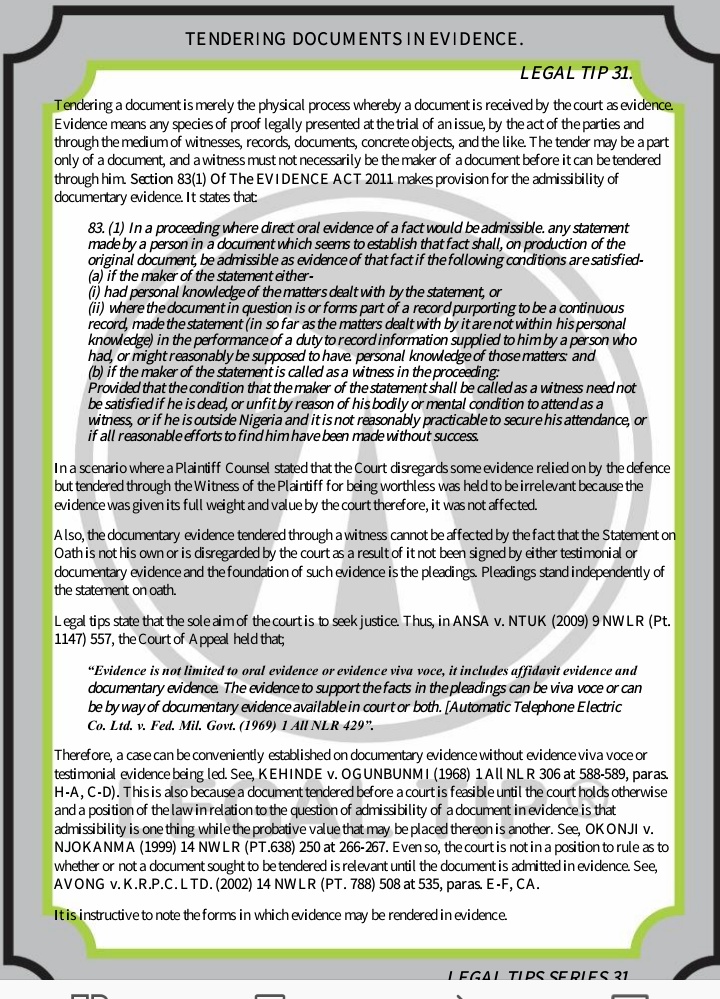Tendering a document is merely the physical process whereby a document is received by the court as evidence. Evidence means any species of proof legally presented at the trial of an issue, by the act of the parties and through the medium of witnesses, records, documents, concrete objects, and the like. The tender may be a part only of a document, and a witness must not necessarily be the maker of a document before it can be tendered through him.
Section 83 (1) Of The EVIDENCE ACT 2011 makes provision for the admissibility of documentary evidence. It states that:
- (1) In a proceeding where direct oral evidence of a fact would be admissible. any statement made by a person in a document which seems to establish that fact shall, on production of the original document, be admissible as evidence of that fact if the following conditions are satisfied-
(a) if the maker of the statement either-
(i) had personal knowledge of the matters dealt with by the statement, or
(ii) where the document in question is or forms part of a record purporting to be a continuous record, made the statement (in so far as the matters dealt with by it are not within his personal knowledge) in the performance of a duty to record information supplied to him by a person who had, or might reasonably be supposed to have. personal knowledge of those matters: and
(b) if the maker of the statement is called as a witness in the proceeding:
Provided that the condition that the maker of the statement shall be called as a witness need not be satisfied if he is dead, or unfit by reason of his bodily or mental condition to attend as a witness, or if he is outside Nigeria and it is not reasonably practicable to secure his attendance, or if all reasonable efforts to find him have been made without success.
In a scenario where a Plaintiff Counsel stated that the Court disregards some evidence relied on by the defence but tendered through the Witness of the Plaintiff for being worthless was held to be irrelevant because the evidence was given its full weight and value by the court therefore, it was not affected.
Also, the documentary evidence tendered through a witness cannot be affected by the fact that the Statement on Oath is not his own or is disregarded by the court as a result of it not been signed by either testimonial or documentary evidence and the foundation of such evidence is the pleadings. Pleadings stand independently of the statement on oath.
Legal tips state that the sole aim of the court is to seek justice. Thus, in ANSA v. NTUK (2009) 9 NWLR (Pt. 1147) 557, the Court of Appeal held that;
“Evidence is not limited to oral evidence or evidence viva voce, it includes affidavit evidence and documentary evidence. The evidence to support the facts in the pleadings can be viva voce or can be by way of documentary evidence available in court or both. [Automatic Telephone Electric Co. Ltd. v. Fed. Mil. Govt. (1969) 1 All NLR 429”.
Therefore, a case can be conveniently established on documentary evidence without evidence viva voce or testimonial evidence being led. See, KEHINDE v. OGUNBUNMI (1968) 1 All NLR 306 at 588-589, paras. H-A, C-D). This is also because a document tendered before a court is feasible until the court holds otherwise and a position of the law in relation to the question of admissibility of a document in evidence is that admissibility is one thing while the probative value that may be placed thereon is another. See, OKONJI v. NJOKANMA (1999) 14 NWLR (PT.638) 250 at 266-267. Even so, the court is not in a position to rule as to whether or not a document sought to be tendered is relevant until the document is admitted in evidence. See, AVONG v. K.R.P.C. LTD. (2002) 14 NWLR (PT. 788) 508 at 535, paras. E-F, CA.
It is instructive to note the forms in which evidence may be rendered in evidence.




